#social media has normalised always being on guard
Explore tagged Tumblr posts
Text
I am tired
I am tired
And I have been for a while
My eyes want to close
To stop seeing
But everytime I try to
The world opens them again
I am tired
And there is nothing I can do
I want to cover my ears
To stop hearing
But everytime I try to
The world drags them down again
I am tired
And maybe I always will be
I want to rip apart my heart
To stop feeling
And everytime I want to
The world doesn't stop me
I have to
#original poem#poetry#poem#again abby by miski inspired dam it#it's about wanting to rest in this busy world#and not being allowed to#social media#social media has normalised always being on guard#you have to be politically active#you have to know latest trends#but when you should sleep#when you should rest#they actively prevent you from that#but when you need help#from your community for example#when you have mental health issues#or was molested#or experienced any type of injustice#9/10 they don't care#or they don't want to#the world doesn't help you with being kind to yourself#you have to#sorry for that rant
2 notes
·
View notes
Text
Why I Ship Johnny/Female V Part 3: V, and You, and Me
[Part 1] [Part 2] [Part 3]
I’ve spent a lot of time in this essay series so far focusing on one half of the pairing. Johnny is fascinating, but he’s only one half of the dynamic. So what about V is interesting? Why does she stand out as a character, in the context of this pairing?
Across different ships, I’ve noticed a consistent pattern. There tends to be one character that the fandom focuses in on to thirst over and one that the fandom imagines themselves being. In this ship, the thirst-character tends to be Johnny, while the self-insert character tends to be V. And that’s not surprising, considering that V is essentially our self-insert into the world of Cyberpunk 2077. It’s also worth noting that people who engage in shipping and transformative fandom tend to be predominantly AFAB, myself included, and it makes sense that when writing sexual stories we’d want a self-insert who has our anatomy.
But fans being AFAB doesn’t usually impact what ships are popular. Shipping is infamously dominated by M/M couples who are, ninety percent of the time, cis. Usually, that impulse to self-insert results in an exaggeration of top-bottom dynamics rather than genderswaps or increased focus on M/F couples.
And the thing about V is, she isn’t just a self-insert. In fandoms focused on open-world RPGs, there tends to be some focus on the player character. However, that focus tends to be limited to the Tumblr-ish, transformative end of fandom. One of my other favourite video game fandoms is The Elder Scrolls. There, people avidly draw and discuss their versions of the protagonists on Tumblr and AO3. But on Reddit and Facebook meme pages, the focus is much more on the other characters, the lore, the worldbuilding.
In this fandom, though? I’ve seen more Vs on Reddit than I have on Tumblr. On Reddit, you’re bombarded with beautiful screenshots of V after V. On Tumblr, there’s tons of new names for V, lovingly thought out backstories and more. And when I see V being shipped with Johnny, V is almost always depicted as female, despite there being an option for a male V and despite the norms of shipping favouring a male V.
So it’s clear that female V inspires more affection than most RPG protagonists. Part of that is to do with Cherami Leigh’s voice acting that I covered in Part 1. But I also think there’s a lot in V’s writing that influences things this way.
CD Projekt Red’s writers are known for focusing on character and plot over worldbuilding in their writing. There’s no, ‘I used to be an adventurer like you...’ in their games, no blank-slate hero or awkward, generic background dialogue. Instead, their other protagonist, Geralt, reacts to chasing after goats and weird children and ancient beings as his own person. The world he inhabits is similarly richly drawn, with even the most bland of background guards discussing gimps and birthdays.
There’s also no black-and-white morality. Even in The Witcher games, their fantasy series, the morality leans much closer to Game of Thrones than The Lord of the Rings. This means that their characters are always three-dimensional. Their first true RPG is actually Cyberpunk 2077. Oh, sure, they’ve done games with rich worlds and lots of sidequests, with skill-trees and moral options, but they’ve always had an authored character, with his own slants and biases. Even when Geralt picks the moral option, he’s likely to be cynical about it, and he always leans towards being a grizzled libertarian who’s Done With This Shit at heart.
Despite their provision of a relatively blank-slate character in this game, this influence lingers on in Cyberpunk 2077. One of the big critiques of the game at launch was that the much-hyped lifepath system felt clunky and didn’t have much of an influence on later gameplay. It’s true that the backstory sacrifices some smoothness of plot and introduction to the world.
But what it gets rid of in those aspects, it makes up for in characterisation. No matter what path you choose, V is never an anonymous prisoner, a mysterious courier or a long-forgotten colonist. She has a clearly defined context, and real roots in the world around her. Even after you move past the prologue, V has the network of people around her you’d expect for someone already embedded in the world. After you’re shot, you don’t just go to some random ripperdoc; you go to Vik, her regular ripperdoc and friend. You don’t get the tarot sidequest from reading an anonymous shard; you get it from Misty. Jackie dating Misty suggests that he introduced V to Misty and Vik. V getting to know them through Jackie feels natural, and just like the kinds of close communal networks that spring up in large cities. Meanwhile, the unique dialogue options for each lifepath keep reminding you that V had a life before you met her.
And that’s true even for the other dialogue options. Here’s a minor, early-game set of dialogue choices from Cyberpunk 2077:
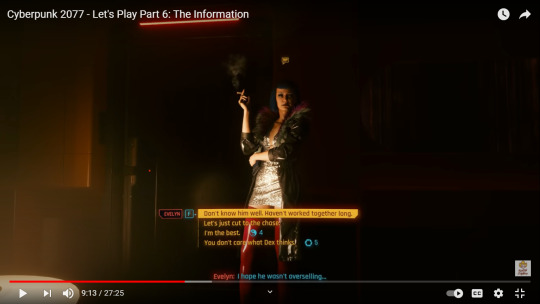
And here’s a similarly minor, early-game set of dialogue choices from a recent RPG that shares a lot of tonal and thematic similarities with Cyberpunk – The Outer Worlds:
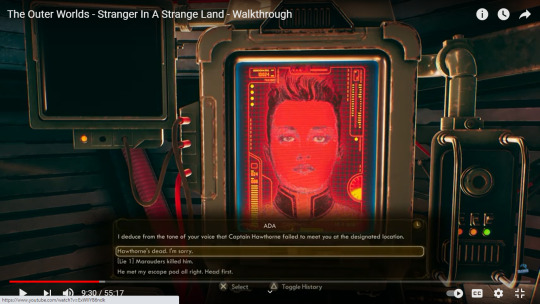
Notice the difference in attitudes allowed by each set of dialogue options. The player character of The Outer Worlds has the opportunity to respond compassionately, snarkily or lie for their own advantage. Deception is specifically highlighted and controlled by a skill tree, and each dialogue choice has its own tone and flavour. Meanwhile, all of V’s dialogue choices can be interpreted as some kind of attempt at deception. They’re also all written in the same voice. While The Outer Worlds offers matter-of-fact kindness, brevity and colourful imagery, V’s dialogue choices all share sentence fragments, spunkiness, bluntness and emotional volatility. No matter what choices you make, V’s attitude and voice always stays the same.
The way dialogue choices are controlled is also worth examining. There seem to be more choices on the surface in Cyberpunk, but a full half of them are controlled by skill trees. Level V up differently to this YouTuber, and they may not even be available. The skills themselves also betray a lack of choice here. While speech is split into five different skills in The Outer Worlds, and the skill used here is directly named ‘Lie’, in Cyberpunk 2077 the skills are simply named ‘Reflexes’ and ‘Cool’. That’s partially due to differences in RPG mechanics, which is beyond the scope of this essay. But look at the names themselves. While The Outer Worlds singles out deception, and bluntly names it for what it is, Cyberpunk 2077 frames quick thinking and bluffing as simply part of the reactions and social attitudes required to survive in Night City. Even the very names of the game mechanics are coloured by V’s attitudes.
While V’s status as an independent character is coloured by CD Projekt Red’s previous experience, it’s definitely not an accident. They had an entire trailer dedicated to answering the question of who V is. For the question of whether V keeps her own personality to be compelling, V has to have a personality in the first place. And in the Temperance ending, the emotional impact of seeing V as an NPC in cyberspace, as well as the final, long shot of V’s face on the bus, depends on you having built up a relationship with her as a separate character. She’s a fascinating mix of self-insert and defined character, and purely from a writing perspective, breaks a lot of new ground for RPG protagonists.
But back to the subject at hand: shipping. She’s just self-insert enough for you to imagine yourself as part of a heightened reality, as someone blisteringly witty, quick-thinking and intelligent. And feeling competent and confident, whether in the real world or in-game, brings you back into your body and makes you feel confident enough to pursue what brings you pleasure. But V’s also just enough of her own person that you can care for her and want her to be happy. That combination of affection and wish fulfilment is what the best ships are made of.
Another huge part of V’s popularity in the Cyberpunk fandom comes from the way gender, or the lack of it, interacts with her characterisation. Of course, you can make her look and dress however you want; that’s one of the beautiful things about RPG protagonists. But her lines and interactions with other characters, thanks to them having to be voiced by male V as well, are refreshingly gender-neutral. To understand this further, let’s take a look at some concrete examples.
Cyberpunk 2077, particularly during the prologue and Act 1, takes a lot of inspiration from Grand Theft Auto. Fast cars, exciting crimes, the obligatory strippers and prostitutes; they’re all there.
These kinds of gritty, sexualised game worlds have attracted criticism from feminist media analysts for normalising violence against women and normalising extreme violence as the default and desirable way of responding to the world. What I think about these takes would take its own essay to get into. But the part of these critiques I do agree with is this. By having protagonists in these worlds always be hypermasculine cis male protagonists, and by having victims of crimes and sexualised characters always be cis women, these worlds repeatedly and unnecessarily sideline anyone who’s not a cis man from imagining themselves having power and agency.
However, where Cyberpunk 2077 differentiates itself from other examples of these game worlds is its lack of gendered differentiation for its protagonist. Ninety-nine percent of the time throughout the game, male and female V voice exactly the same lines. This means that if you choose to play as female V, female V is characterised exactly the same way as male V.
Let’s take a look at some concrete examples of this. The biggest is V’s relationship with Jackie. It’s rarely that you see a male-female friendship that stays as platonic as this one does in media, and I welcome it. The quest called ‘The Ripperdoc’ demonstrates this, in the conversation when Jackie and V drive to see Vik:
Jackie [with relish]: ...I got a date - me and Misty.
V: You don’t say...
Jackie [confidentially]: She’s soooo sweet. Really gets me, y’know?
Jackie describes his relationship with Misty in respectful terms, and isn’t afraid to detail the emotional aspects of his and Misty’s connection. But he doesn’t hold back on the macho bragging either. In these lines, and especially in the pleased, suggestive tone of the first line, it’s clear he’s proud to be the kind of guy who could date someone like Misty. The presence of both of these attitudes together shows that Jackie both trusts V and considers V a part of his traditional-masculinity-valuing world. It’s less ‘not like other girls’ and more ‘not like other mercs’.
Similarly, while V’s first interactions with Johnny do draw from highly gendered relationship dynamics, the actual content of V’s responses undercut any feminising this would give her. Here’s one exchange from ‘Playing For Time’:
Johnny: The fuck kinda joytoy are you supposed to be?
V: Fuckin’ ghost off!
Johnny calls V a whore. Before and after, he physically hurts her in ways that, in my opinion, have a highly sexual undertone. But the crucial bit is how V responds here. She neither responds in a helpless, damsel-in-distress sort of way, nor in a defiant, sassy heroine way, where she might take the gendered insults and own them or prove them wrong via physical prowess. In fact, she doesn’t react to the gendered aspect of Johnny’s comment at all. Where a game with a Strong Female Character (TM) would use gendered jabs to refocus attention on said character, Cyberpunk blows them off to focus on the reality of this particular character’s situation.
Outside of V’s closest relationships, this gender neutrality can also be seen in the wider world of Night City. Dexter DeShawn is one of the most tropey, Grand Theft Auto-esque characters you meet in the game. As such, he’s one of the best barometers for how gender interacts with the ‘usual’ state of the world. And how does he react to a female V?
The answer is, not at all. He addresses her as ‘Ms V’, but that comes across as less about her and more about him being high up enough in the world that he can afford affectations. Her gender simply isn’t relevant. While this is increasingly common in pop culture, it’s still rare in worldbuilding like this, where gender is all too frequently used as a lens through which to explore violent, chaotic worlds. In a type of world and tone where gender roles are traditionally emphasised , V slips past those roles and is allowed to exist beyond them.
But why does gender neutrality make V more appealing to ship? To answer that fully, it needs to be combined with my next point.
V is also compelling to ship because her characterisation gives a safe platform from which to imagine her being vulnerable. What I mean by that is this. The main aspect of V’s characterisation in canon is her status as a merc. How you experience her life, through gameplay and through the situations she gets into, is through her skills at hacking, sneaking and killing. You don’t just witness her competence, daring and toughness; you share in it.
When writing fiction that focuses on romantic relationships, one of the toughest balances to get right is that of competency and vulnerability. Any good romantic arc involves watching a character’s barriers come down, seeing how they react to the other person when they lay aside their protective pretences. But this can’t happen too soon, or too much, for either the protagonist or the love interest. Competency and assuredness are huge parts of what makes someone attractive, and they’re also huge parts of feeling like you can come out and play, sexually speaking. Even for the biggest submissive on the planet, the submission has to be a deliberate choice to be hot.
Taken together, V’s canonical characterisation and the possibilities and conventions of fandom provide the perfect balance of those two qualities. Canon makes it clear that V is capable and strong. When you or I imagine our Vs with Johnny, that buildup of ‘competence capital’ makes it feel safe enough to imagine V vulnerable.
And that safety is vital when shipping any character with a character like Johnny. This is where the gender neutrality I talked about earlier comes into play. Imagining V vulnerable feels safe. So does imagining V in a dynamic with a guy who’s a tropey bad boy. Because V is written in such a gender-neutral way, it lets the player enjoy all the deliciously dangerous aspects of her relationship with Johnny without the distractions that may come from feeling disempowered. It also refreshes all the clichés of Dangerous Guys, making their impact feel fresh and new again. Her ability to walk the line between wish fulfilment and independent characterisation inspires simultaneous identification with her, affection for her and boosts in confidence for the player.
This is why she’s compelling to ship. Johnny brings in the familiar emotional arcs of classic tropes, while V makes them new. So what happens when you put these two characters together? Just what about the way they bounce off each other has inspired the majority of fic and art in this fandom?
That’s what I’ll talk about next time.
[Part 1] [Part 2] [Part 3]
#cyberpunk 2077#cp2077#cyberpunk spoilers#cyberpunk game#cyberpunk v#v#female v#johnny silverhand#essays#meta#analysis#long post#my writing#video games#gaming#cyberpunkgame#cd projekt red#v/johnny#johnny/v#v x johnny#johnny x v#silverv#jackie welles
27 notes
·
View notes
Text
The Duality of this Strange Existence: Week 9, Spain
Stuck in Spain for the foreseeable future, it’s easy to feel deflated. And I have been. But I’ve also seen the duality of things, opposing sides of the same situation which now affects us all. As coronavirus continues to grind the world to a halt, I continue writing in an attempt to make sense of life on the road.

This blog post comes a few days late because I honestly couldn’t bring myself to write it. What do I write? Where do I begin? From a micro perspective, my life here has been pretty uneventful, and yet from the macro perspective, so much has happened around the world due to the outbreak of Covid-19 that it feels like we have enough news for a whole year from just one week. And yet, the only perspective I can write from is my own. Armed with the encouraging words of friends and family, I am inspired to push on and get some of the thoughts in my head and experiences from our ninth week ‘on the road’ down onto paper.
One of the ways I’ve started to see our experiences in lockdown is through this idea of duality.
Every situation that I’m in (and no doubt most of us are in) sort of seems to have two sides. I alluded to this in last week’s blog post, and the way in which it’s possible to see great sadness, selfishness and suffering at the moment, but also to be inspired by so many of the positive responses and the potential positive outcomes of this pandemic.
From a chronological perspective, our week has been divided into two clear halves, another duality of sorts. George and I spent the first half of the week in Suzi the Van, in the Marina in València which we’d been staying for a while. Whilst the Marina had all the basic amenities and we were safe there, the confines of a space that small were really taking its toll. On Tuesday, when I was made to return to the van by a security guard after attempting to walk short laps nearby, I broke down into tears. Never before have I valued the outdoors so much, wanted to stretch my legs and take in some fresh air. It was heartbreaking, and scary to lose a liberty I take for granted.
As urban areas seem to be hotspots for the virus, València was under tight control. A simple trip to the supermarket hammered that reality home, when George and I were asked by Police to walk on opposite sides of the street from one another, and a one metre distance was enforced by cashiers and guards in supermarkets. Gloves are mandatory in some supermarkets, and most folk you do see are wearing masks.
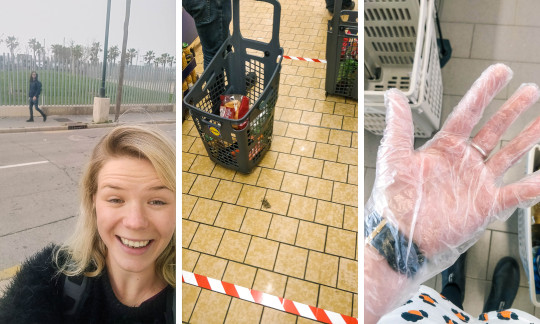
(images, left to right) Being made to walk on separate sides of the road in Valencia, tape marking out 1 metre separations in the supermarket, and gloves to be worn by customers.
Extreme measures quickly start to feel normal.
Whilst we tried to make the best of being in Suzi the van, having fun together and finding any possible way to entertain ourselves, the claustrophobia-inducing confines were soon wearing thin. After making arrangements with the family friend whose cottage we had stayed in a few weeks earlier in Catalonia, we quickly made the six-hour journey up north to return to their cottage as a safer lockdown spot. George and I were also conscious that restrictions on driving were only likely to tighten, so we made the escape while we could. That said, we weren’t stopped by Police the whole way up from València to Palamos.
Relying on the generosity of others can be a very humbling thing. I am reminded every day that I wouldn’t be here in Spain, with a safe place to stay during the (now extended) ‘State of Alarm’ if it wasn’t for the kindness of others. In times like these, I think we will see more sharing of resources, and the idea of asking for help becoming more normalised too. If I can help someone else in any way, please do reach out to me.

(images, left to right) Saying goodbye to Suzi’s parking spot at La Marina, silly antics as George refuses to get out of bed in the morning, and making our way north to Catalunya.
Since leaving València, the second half of our week has been rather more comfortable than the first, as we’re now in the countryside and with a house to stay in. That said, I’ve been pretty miserable these past few days, burdened with the knowledge of the global crisis and the impact it’s having on literally everyone I know. Which brings me to another duality -
Whilst those of us in lockdown who aren’t sick with the virus technically have all this unique free time to potentially make and create, the panic and anxiety induced by the situation can be crippling.
Obviously, everyone’s working situation is different: some people are working from home, others have lost their jobs, others are being paid some or all of their wage but don’t have any work to do, and then there are the doctors and nurses, supermarket attendants and maintenance workers who literally risk their lives to go to work and keep the situation afloat. But, looking more generally at the whole population, when else in history have so many people been given a chance to stay at home, with no routine and no commitments?
When trying to think positively, I have seen this lockdown as an opportunity for making and creating on an unprecedented scale, for people to use the freedom and inspiration as a platform for self-expression, a sentiment echoed countless times online too. And yet, even though I’ve managed to get things done and make things in this last week, it has always been counteracted by another feeling in my head and heart, one which has pushed against the desire to ‘do’ with a desire to… mourn? I’ve heard the anxiety triggered by the unknown of the future termed as ‘anticipatory grief’, and it’s exactly this which can cripple any desire or instinct to create and make. The idea of anticipatory grief is explored in an article which my friend Greg sent to me today, and I found it incredibly useful. You might do too.
Living with an unknown future is forcing a shift towards being more present.

(images) Small things that I am trying to grateful for, like fresh houmous, strawberries blooming and an open fire.
You don’t realise how much you base your life around an assumed future until that future crumbles into the unknown. I assumed that I would be able to fly home for a doctor’s appointment in April, I assumed that Las Fallas festival would take place in València and George and I would finish our commercial work linked to it, I assumed that we would catch a ferry to Italy and drive south-east through Slovakia and Croatia and that we would see our friends later in Greece as planned.
Obviously a big outcome of all those future things now being cancelled or uncertain causes anxiety and the ‘anticipatory grief’ that I mentioned. But it has also triggered a return to the present. I wonder if other, more mindful, cultures are generally more present-focussed because they don’t have the luxury of the certainty of the future - places where death is more frequent and disasters more likely to happen, unsheltered by the insurance and capital we are so ‘lucky’ to have in the Western world. For me, I am trying ever so hard to embrace the present. It is an uncomfortable feeling, to be okay and connected to the now rather than to what is to come, but it also feels like a very valuable mindset to nurture.
A focus on the present is perhaps why so many of us have suddenly connected with friends and family digitally. Of course, some of these calls are intended to replace what would usually be a face-to-face catch up, but for George and I, we wouldn’t be set to see a lot of people for a while as we’re overseas anyway. And so all these phone conversations, WhatsApp catch-ups, Zoom calls and Skype videos have been a direct action to bring those people that mean something to us closer. People are reaching out to each other, in the present, and are showing the gratitude, connection and care they have for each other through just saying hi. Perhaps we all forgot quite how important these people were to us because we were always thinking in the future?
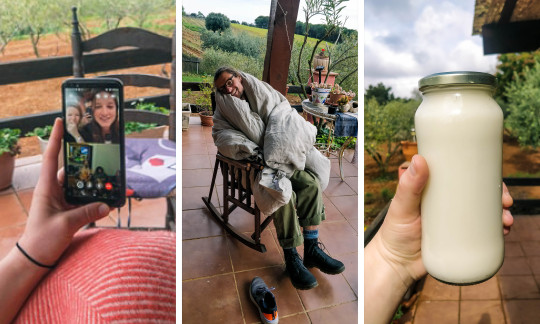
(images, left to right) Connecting with friends in Australia, George going a little bit insane, and my first attempt at making oat milk (which I would rate a totally mediocre 5/10) which was a good short-term distraction from the overwhelming global crisis and a good starting point to make improved versions!
I’ve also been reminded that the internet can serve to connect and inform, but it also has the potential to alienate and divide people.
I honestly can’t imagine experiencing lockdown without access to the internet. This week alone, I’ve probably read tens if not hundreds of useful, mind-expanding, informative news articles, in addition to opinion pieces and videos related and linked to coronavirus. I’ve been able to watch (along with 80 or so others) our friend Dan live-stream a spirit-lifting musical performance from his bedroom as part of the ‘Solo En Casa’ festival, and I’ve taken part in a genre-defying guided meditation by the wonderful Adam Martin from Gaba Podcast. My mum did her first online yoga class, my Dad has been playing virtual Scrabble with his friends, and that’s all on top of the phone calls and video calls that ping around between us all every day.
Yet whilst I sing its praises, the internet also has darker qualities in times like these. There are no ‘ground rules’ for the internet, and social media can start to become a bit of a Wild West where opinions get flung around and judgement passed. Lockdown restrictions seem to change everyday, and you see plenty of neighbourhood vigilantes who take it upon themselves to report and criticise other people for the rules that they break, people in government for the rules that they make, shoppers for the food that they take. I find myself engaging in this circle of judgement too, and yet it goes against the principles of community and solidarity that are needed now more than ever.
Not only does the internet make space for judgement, but for jealousy as well. In presenting selected elements of our lives we can create idealised images of what our lives are really like, and in sharing certain things we can highlight what others don’t have. Sharing photos and stories is a great way of connecting with others, but the flipside of this digital culture addicted to sharing is that we sometimes lose sight of what we have. This week, I’ve taken a bit of a step back from Instagram and Facebook both to focus on my present situation and the immediate world around me, and not to incite jealousy or comparison. I’m interested to see how I find this change.
Unrelated to the current pandemic, we’re incredibly excited to finally have a launch date for Broaden’s upcoming documentary, ‘The Hundred Miler’.
Announcing the release date was in part triggered because we realised that this is a time when people will be at home, available to watch an independent documentary about ultra running. But announcing the launch of The Hundred Miler also highlights another duality: that while there is a global crisis going on which involves a terrifying, easy-to-transmit illness causing an influx of deaths, the ‘normality’ of everyday life is running in parallel. People are still doing homework with their kids, others are watching Netflix before they go to bed and walking their dogs, and George and I are still trying to edit videos and launch Broaden.
And so, now seemed as good a time as any to finally get our first big film out into the world. We’ve created a facebook event to promote the launch on the 11th April, and throughout the runup in the coming three weeks we’ll be releasing snippets of the film too. I’d love for as many of you to join the facebook event and catch the video when it’s out.
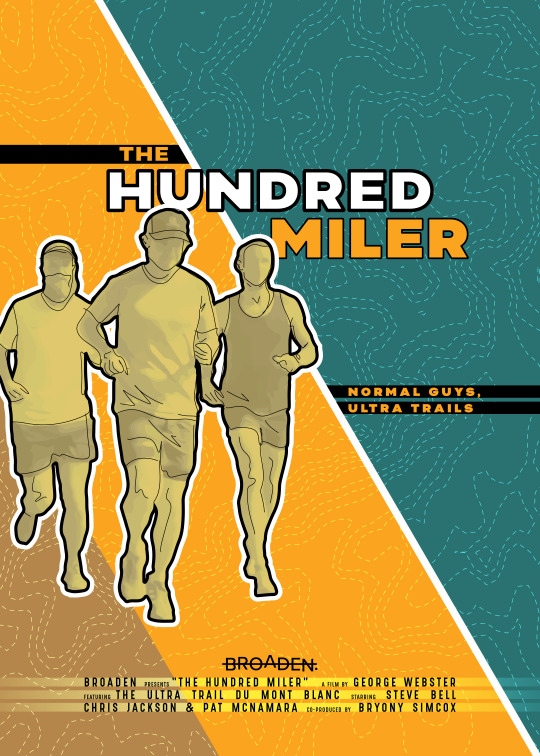
Having a creative project like this documentary throughout lockdown has been a lifesaver, as it’s pushed me to move towards the positive side of the dualities presented by coronavirus: trying to ‘do stuff’ rather than getting bored, trying to make something rather than being crippled by anxiety, trying to make the most of the space we have rather than feel trapped in our surroundings, trying to be present rather than fretting about the future.
All that considered, the critical word in the statement above is trying. I’m trying, and not always succeeding, to see the positive side of things. I think one of the reasons it took me a while to finally write this blog post is because I wanted it to come from an authentic place, and at first it felt like a failure that I didn’t have only good things to report. But in processing how I’ve been feeling these past seven days, the most authentic message is that I haven’t been purely positive, and things have been rough, and that that’s okay too.
The duality of life is what gives it character, and I think some of the dualistic qualities of this period of lockdown are what’s making it such a strange thing for us to all grapple with too.
Does any of this make sense? I hope so. I hope I’m not alone in these feelings and I hope that in some way this blog brings us closer together. These are strange and scary times, folks.
Stay safe and stay sane. x
0 notes
Text
What have I ‘got’?
Brain damage, or ‘Acquired Brain Injuries’, depending who I’m speaking to, my ability so say, and spell ‘subarachnoid haemorrhage’ appears to be working against me, in the UK’s labyrinthine and convoluted disability benefit system, though.
I have a task on my desk, it’s a self-set task, and I don’t want to do it, but my Welfare Rights Advocate is proving himself unreliable. He’s supposed to be ‘supporting’ me with my PIP tribunal, but he’s evasive, untrustworthy, and a little bit patronising. I have a note of all the times he’s said he was going to do something, and then not done it, frustrating for me, because I’m out of my depth with the tribunal evidence. (I’m not, I’m fully conversant with the majority of the 300+ pages on my desk, most of it being the evidence I submitted in the first place. I’ve typed-up the notes I took contesting the speculation, omissions, and, shall we say ‘mis-recorded results’ from ATOS/DWP, so the Advocate can read them. I’ve also tidied up the bits I’d put in ranty capital letters, and toned down the swearing.)
The task. When I was referred to Workplace Well-being, about a year ago, my Union Representative asked me to ‘write a list of all my difficulties’ to take with me. ‘Other’ people love a good list, don’t they? (’Othering’, there, watch yourself.) I didn’t want to ‘write a list’, mainly because I hate reflecting on all of the things ‘wrong’ with me, but also because loads of paper with just ‘things’ noted on them in a random order serve no functional purpose. The rep will have seen it as a memory aid, in case I forgot something, my functional/working memory does let me down on a regular basis, there are work-around strategies for that. I wrote the list, because I was very mindful of the need to follow instructions, but the original nurse who assessed me (before transferring my case to a doctor, who told me “This case should never have been assessed by a nurse, it’s far too complex.”) didn’t look at it. No reflection on her procedural-practice, there, she asked me questions, and I was able to answer most of them. The Union Rep was frustrated with me when she saw the nurse’s report, and asked me if I’d ‘really’ explained my difficulties. Well, Union Rep, yes, I did, that’s why the nurse is recommending that I’m ‘unfit’ for a minimum of 12 weeks, and need a full functional/cognitive assessment via Neurology. (Honestly, am I the only one who can read? Still haven’t had the functional assessment, either.) That was the start of the task, and I need to re-do it.
I was going to go list-style again, but break it into Physical/Intellectual/Emotional/Social categories. (Yes, I did support GCSE Health and Social Care lessons, about a million years ago.) Breaking my ‘list’ into categories gives me an element of control, I only have to focus on one ‘bit at a time, it reduces the risk of me becoming overwhelmed at having to think of all of it, all at once. Again. I’ve spent almost three years trying not to reflect too much on which bits of me no longer function properly, and the adaptations I’ve absorbed/normalised to keep myself, and others safe, now the PIP-system is making me do precisely that. A ‘list’ of all-that-ails-me still serves no purpose, it would be like the world’s worst shopping list, “Constant headaches, light aversion, sporadic tics and tremors, mood swings, sleep disturbance, have we any milk left, inattention.” It would just be a load of words, on some paper, the Advocate boldly stated that he’d write my ‘witness statement’ for me, I think he meant ‘impact statement’, but I’m not having a man who uses multiple consecutive punctuation marks in text-messages writing anything ‘for’ me. He doesn’t live in this state, I do.
Right, it’s not going to be a list, it’s going to be a table, ‘Issue’, ‘Impact’ and ‘Adaptations/Strategies’, broken down into the ‘PIES’ categories, for ease of reading by other people. Yes, I ‘could’ potentially be shooting myself in the foot, here, because the adaptations/strategies I’m using mean that I ‘can’ complete the majority of the ‘descriptor activities’. Eventually. That’s what’s REALLY wrong with the PIP-system, apart from it being operated by shady individuals only interested in finding a way to refuse claims, in my experience. I didn’t tick the ‘unable to’ box for any of the descriptors, and I’m smirking now, about my ‘traits consistent with Autism’, I won’t lie, and it doesn’t matter how many times DWP/ATOS ask me the same question (not even bothering to change the phrasing, amateurs.) they will get the same answer, because this is my life. DWP/ATOS are using a one-size-fits-all template for EVERY disability claim, it’s the same form for every applicant/disability/condition, and it’s heavily skewed towards physical capabilities. ATOS/DWP are effectively banging a hamster through the star-shaped hole on a Fisher Price shape-sorter, certain tabloids and media sources are shouting at the hamster to stop being lazy, and run, and then the ‘assessor’ gives the shape-sorter a good kick, and ticks the ‘able to move 20m’ box. If you’re not paraplegic, or in a coma, you’re not disabled-enough for this system, ‘making work pay’, and all that, ‘we’ must be capable of something. (Side-smirk, because the ‘work related activity’ scheme in my area is run by Serco, do we think I’d suit a security-guard uniform?)
I spent 6 hours last weekend line-by-line picking through the ‘evidence’ DWP/ATOS might-intend to submit to the tribunal. I say ‘might’, because they’re asking the panel to dismiss my case unheard, SUPERB scare-tactic there. Some people would give up at that point, unfortunately for DWP, I’m not one of them. I say ‘evidence’ because most of the ATOS-end of it is speculation and opinion, there is literally no reference made to the medical evidence I submitted until now, when I’m effectively taking them to court. Process that, they’ve had a huge pile of medical evidence from me twice now, and they make no reference at all to it, focusing instead on my ability to ‘bend forward at the waist and reach mid-shin with both hands.’ The last nurse-practitioner that ‘assessed’ me has recorded results for a ‘test’ she didn’t do, and very-much ‘mis-recorded’ some of her other ‘informal observations.’ My functional memory fluctuates, but my stress/crisis recall is phenomenal, my A-level ‘General Studies’ exam paper had an article from a Spanish newspaper about foxes, the only question I couldn’t answer on my GCSE Maths paper was the spider-diagram one, when I was 11, my primary school teacher made the whole class copy from a reading book as a punishment. “A Dog So Small, by Phillipa Pearce. The tapping on the window woke him, fast asleep, and then wide awake, because of the tapping. Perhaps the pigeon always woke this early, he was usually tapping when the boys awoke. That was usually much later, with the smell of breakfast...” Put me under ‘test conditions’, or in a stressful/crisis situation, and my recall will be utterly flawless, I’m buggered if I can remember what I went into Tesco for, though.
My ridiculous memory aside, I have nearly 5000 words of annotation/points of contention with the ATOS/DWP evidence/reports, it’s possible that I’ve typed more words than the ‘assessors’ and ‘decision makers’, AND all of mine are spelled properly, even the really big ones. (Irritability, classic symptom of frontal lobe brain injuries, I get the “Can’t people READ/WRITE?” anger very frequently.) A couple of pages in, the boss decision-maker has recorded “has mental health issues” before even mentioning the brain injuries. I’ll leave out the side-rage at the lower-level decision-maker recording “she is not depression.” on another page, no, dear I’m not depression, but I am about to make your life less pleasant.
“Has mental health issues.” is what triggered this pile of waffle, that, and REALLY not wanting to start the PIES-table thing. ‘Has mental health issues’ is what ATOS/DWP will likely use as their ‘get out of jail’ card, because when someone has mental health issues, the go-to option is medication, whack enough Prozac in us, and we eventually stop complaining about stuff, don’t we? Do I have ‘mental health issues’? Probably. Do I have any active diagnosis of a mental health condition requiring medication? No. I don’t know if they’re referring to my PTSD, or speculating based on my presentation at assessment. If they try to suggest that I am suffering from depression, I have medical evidence from two different doctors that I’m not, and the idiot who typed ‘is not depression’ onto the forms has undermined that ‘argument’ before it starts.
I was relatively functional within the parameters of my PTSD, actually, no, I was hyper-functional in many areas, which is why I was so very good at some parts of a career I no longer have. That hyper-functionality is hard-wired, but my brain is now re-wired, there are tangles of wires sealing up two aneurysms, and a third one just sitting there lurking in a ‘risky’ position on my Choroidal artery, if that one blows, it’s ‘Goodnight, Vienna.’ I’m still incredibly high-functioning, but only for part of the day, my brain effectively does a whole day’s work by lunch-time, because I over-process everything, I can’t ‘not’ do that. The over-processing causes my evidenced-damaged brain to tire more easily than a fully functioning one, by late afternoon, I can feel the fogginess starting to creep in, and I’m next-to-useless in the evening. My long-suffering son has observed his highly intelligent, incredibly articulate mother descend into cognitive fatigue, and sit in this armchair dribbling like an imbecile, and falling asleep. That’s our ‘normal’ now, when he’s back from university, and it shouldn’t have to be, I can’t imagine how traumatic it must be for him watching me ‘slip’ every evening, after being in the ambulance with me while the haemorrhage and hydrocephalus were crushing my brain.
In a weird way, the PTSD over-processing has probably kept me alive. I’m constantly assessing for threats and risks. Constantly. It’s not as linear-simple as applying the cause-trauma to everyday situations, ‘that’ is never going to happen again, for reasons I’m not going to explain here. Constantly, and everything, it was exhausting enough before the additional layer of trauma added by the near miss with the chap with the scythe. CBT won’t unpick it, because if I don’t-assess everything I potentially place myself or others at risk of harm. EMDR can’t do anything to ‘desensitise’ my threat-perception that I haven’t already done myself. The doctors have never found a combination of drugs that balanced me properly, the hyper-vigilance is just a ‘thing’, background noise that was bearable before my brain injuries, it’s exhausting ‘now’, but threat-checking keeps me safe. (I will EXPLODE if DWP/ATOS try to label it ‘generalised anxiety.’)
If they’re not going with the PTSD (funnily enough, I don’t actually have a formal diagnosis, I slipped the term to my GP once, and he agreed, it just sort of ‘stuck’ after that.) it might be the ‘Depression?’ recorded on my initial discharge-notes from hospital after the haemorrhage. (Very irritable face, it’s the same as all of my other faces, you learn how to poker-face quite quickly when you realise that your first impulse on just about anything could land you with a criminal record.) When I was admitted to hospital, the medics asked the ex about my previous medical history, I imagine the kid might have replied “Have you looked in your sock drawer?” if his mother hadn’t been dying in front of him. The ex was useless on anything that wasn’t motorbikes, 1980s synthesiser music, or asking for more toast, the sock-drawer was a running joke between the kid and I, due to the number of times the ex would stand on the upstairs landing, and shout downstairs “Have I got any clean socks?” instead of looking in the bastard sock-drawer. Sock-rage, I haven’t had to deal with that for a very long time, there was some sort of force-field around the laundry basket, meaning he couldn’t put ANYTHING in it. All of his clothes, whether they were the clean ones I’d folded and put on his side of the bed, to encourage him to put them away himself, and stop asking me “Have you seen my Kraftwerk T-shirt?”, or the absolutely minging-filthy work clothes he’d wear for weeks on end, ended up on the floor at his side of the bed. The socks were even worse, he’d come home from work, take his socks off, and leave them in the living room. I stopped collecting them after a while, because I had enough ‘else’ to do without picking up after a grown man. Sock-rant over, the ex told the medic “I think she’s got depression, but I don’t know if she’s on anything for it.” If they’d asked him about motorbikes, or what order to put fillings in sandwiches, he’d have known that.
So, ‘Depression?’ is recorded on my discharge-notes. I REALLY upset the nurse who’d recorded it, in a twist of fate, she was my assigned nurse after the second round of surgery. I was mad at the ex, I wasn’t angry with her, but, at the shift-handover she described me as ‘strange, controlling and manipulative.’ I’m not manipulative, am I?
I probably ‘should’ be depressed, but my medical notes state I’m not, so, what have I ‘got’? (I’m putting that in quotation marks because it was the ex’s retarded terminology, a person may ‘have’, or ‘suffer from’ depression, they haven’t ‘got’ it.) What I have is a combination of brain injuries, and some maladaptive coping mechanisms. I have ‘had’ historical mental health issues, and I’m awaiting a neuro-psych assessment to see which diagnostic criteria I fit this time. I have multiple traits consistent with Autism, but I’d always assumed they were due to the traumatic/developmental/attachment issues, rather than an organic cause. Thinking back of myself as a child, yes, I would have ticked most of the boxes for an AS diagnosis. I have traits consistent with Oppositional Defiant Disorder, which is a relatively new addition to the DSM-5, but sits neatly around my tendencies to generally be a Terrible Bastard. My sick-notes were all generic ‘stress related disorder’, because we don’t say ‘nervous breakdown’ any more. Elements of my disability fit the profiles for Chronic Fatigue Syndrome and Fibromyalgia, two of my nieces have disability-awards for fatigue, and they don’t have chunks of metal in their brains. I’m not neurotic, or a hypochondriac, which is a good thing, because the veritable telephone-directory of side-effects from brain trauma would have a ‘worrier’ setting up camp in A&E, there hasn’t been a single day since February 2015 where I haven’t been dealing with one side-issue or another. I probably ‘should’ be more anxious about my health than I am, but that way lies ruin, I assess myself every day, and ‘work with the tools I have’.
Enough of this now, or I’ll use up all of my functional eye-time, and end up having an argument with myself about doing the impact statement ‘tomorrow.’ The PIP system is very flawed, it’s not in the least bit fit-for-purpose, and I need to ensure that my evidence is reasoned, accountable, and coherent. I am a very complex case, but my ability to articulate that is working against me, because the system ‘sees’ me when I’m lucid, not when I’m trying to put both of my socks on the same foot, or finding a meal from several days ago in the microwave. Throw into the equation that Universal Credit is also fundamentally flawed, and it’s fairly obvious why I’m having more wobbly/off days recently. My work-coach has cut me down to 10 hours per week of actively seeking employment, because she’s seen my health deteriorate during this PIP process. That’s all well and good, but I’m on a knife-edge financially, if, despite her doing what she can to reduce my ‘claimant commitment’, the computer system decides to invite me to apply for an unsuitable job, I’m at risk of sanctions. Poverty-porn, I have no heating, I’m sitting here in four jumpers, shopping once a fortnight, and eating once a day. I’m not asking for champagne and caviar, I’m asking for a disability benefit that would allow me to work part-time, because I’m not fully functional full-time.
What do I have? A pile of horrible paperwork, an unreliable advocate, and unemployment benefit that doesn’t cover my basic outgoings. What am I? I’m tenacious, resilient, determined, intelligent, articulate, reasoned, accountable, honest, and bloody exhausted from jumping through DWP’s various hoops.
0 notes